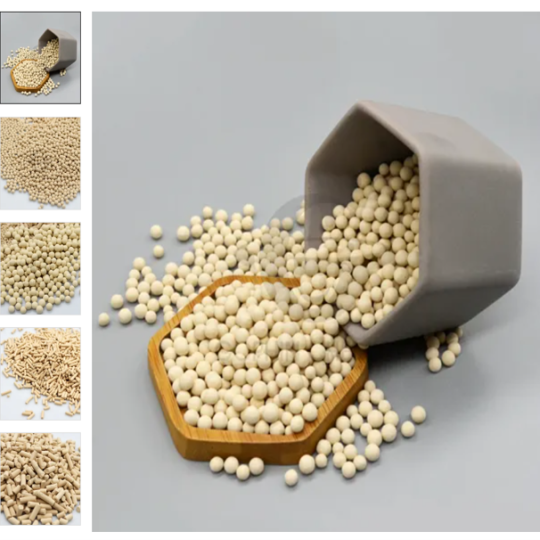Molecular Sieves are specialized materials designed to adsorb gases and liquids, providing essential solutions for various applications, including technical gas purification, petrochemical processing, and oxygen production. Our high-quality molecular sieves, including types 3A, 4A, 5A, and 13X, are available in competitive packaging and can fulfill large quantity orders to meet your needs.
What Are Molecular Sieves?
- Molecular sieves contain small, uniform pores that ively adsorb molecules based on size. Unlike conventional filters, which operate on a larger scale, molecular sieves work at the molecular level. For instance, they can allow water molecules to pass while retaining larger molecules, making them effective desiccants. A molecular sieve can adsorb up to 22% of its weight in water.
- Typically composed of aluminosilicate minerals, clays, porous glasses, zeolites, and activated carbons, these materials create open structures that facilitate the diffusion of small molecules like nitrogen and water.
Technical Specifications
- Chemical Formula: 0.45 K2O . 0.55 Na2O . Al2O3 . 2 SiO2 . 4.5H2O
- Aluminum Silicate Ratio: SiO2 / Al2O3 ≈ 2
- Shape: Spherical
- Diameter: 2.0 - 5.0 mm
- Size Ratio: ≥ 96%
- Bulk Density: ≥ 0.68 g/ml
- Wear Ratio: ≤ 0.10%
- Crushing Strength: ≥ 70 N/piece
- Static Water Adsorption: ≥ 20%
- Ethylene Adsorption: ≤ 3.0%
- Water Content (as shipped): ≤ 1.5%
Typical Applications
Molecular sieves find extensive use in several industries due to their effective moisture absorption capabilities:
- Petroleum Industry: Ideal for gas stream purification and mercury removal from natural gas, protecting aluminum pipes and liquefaction equipment.
- Chemical Laboratories: Used for the separation of substances and drying of starting materials.
- Drying of Unsaturated Hydrocarbons: Effective for compounds like ethylene, propylene, and butadiene.
- Drying Natural Gas: Essential for applications where COS reduction is required.
- Drying of Highly Polar Compounds: Suitable for methanol, ethanol, and other alcohols.
- Dehumidification: Used in static, non-regenerative desiccant systems for glass insulation in double-glazed windows.
Regeneration Methods
Molecular sieves can be regenerated using various methods, including pressure changes (common in oxygen concentrators) or by heating and purging with a carrier gas, as in the dehydration of ethanol.
Conclusion
Our Molecular Sieves/Adsorbent Molecular Sieves are designed to provide superior moisture control across multiple applications. With a commitment to quality and competitive pricing, we are ready to support your needs for effective gas and liquid purification.
For pricing and more information, please contact us directly.


